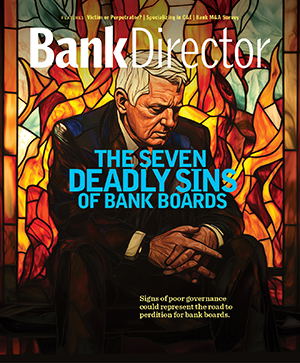
Financial Restructuring for the Millennium-Who`s Ahead?
They did it, they finally did it.
The Congress passed and the President signed into law a giant restructuring of the U.S. financial system (over 400 pages of it)! Frankly, I thought they`d drag it out till next year, since the years of hard-fought battles produced more contributions to congressmen and senators than any other issue in recent history.
My first reaction was that the legislation surely would be good for the big guys: large banks, insurance companies, investment banks, and mutual funds. But in taking a closer look, will it be good for the 8,000 or so little guys in the banking business?
The new law allows all of the above financial types to operate in one enterprise that the big institutions will use to create financial supermarkets. No bank yet has proved that the supermarket concept is what consumers want, and only time will tell if that is the case. Very few small banks are likely to buy an insurance company so that they can underwrite insurance risk, nor will they buy billion-dollar mutual funds.
So what`s in it for the community banks? A lot more competition in their hometowns, for sure. The large-scale independent investment bankers-Merrill Lynch, PaineWebber, AG Edwards, Raymond James, etc. are likely to be providing banking services in all of their offices in thousands of towns, large and small. This also will be the road that large mutual funds and insurance companies like Fidelity, Prudential, and others probably will follow. One company that won`t be able to provide a store-owned bank in all its stores however, is Wal-Mart, since the bill cuts off the approval of the sale of a thrift to the retail giant. Score one for the home team!
Aside from the above, however, there are some other provisions that will be of real help to smaller banks.
The most important one is easier access to funding from the Federal Housing Finance System, previously and commonly known as the Federal Home Loan Bank System. Since funding has become more costly and difficult for many community banks in the last few years, this change will be immensely beneficial. The FDIC recently completed a study that indicated that deposits were funding a smaller and smaller share of community banks` operations. Accordingly, the agency has expressed concern about future funding avenues.
But the new law offers some relief by doing away with the requirement that a fixed percentage of loans must be in home mortgages or related assets. In addition, it allows the borrowing funds to be secured by small business loans and other non-home-lending debt; this greatly expands the ability of smaller banks to use the funding from the Home Loan Banks (whose name is now obviously outdated). From my standpoint, the only concern in using this funding source is remembering that what the government giveth, the government can taketh away.
Thanks to Senator Gramm, a champion of banks and a nemesis of consumer activist groups, small banks under $250 million of assets will have fewer CRA examinations than in the past. Gramm fought hard to have this group completely exempted, but the administration refused. Thus, he was forced to settle for a provision that requires exams every five years for banks with the top rating and every four years for those with satisfactory ratings.
The new law also gets rid of the town of 5,000 requirement on national banks that want to sell insurance and forbids states to discriminate against banks selling insurance. This provision will make it much easier for banks to get into the insurance agency business. And because insurance sales provides the largest and most available pool of fee income to the industry, the new law provides some important avenues for community banks to boost their noninterest income. This change comes at an opportune time: More and more independent insurance agents have come to believe that the most promising way for them to meet the challenge of the new financial world is to sell their agencies to banks.
Taken as a whole, the new legislation probably nets out as a plus for community banks. Of course, it means competing with giant financial services organizations, some of which may grow so large that they`ll trip over their own expanded bureaucracies and executive egos. And as we used to say in my football days, The bigger they are, the harder they fall.

Join OUr Community
Bank Director’s annual Bank Services Membership Program combines Bank Director’s extensive online library of director training materials, conferences, our quarterly publication, and access to FinXTech Connect.
Become a Member
Our commitment to those leaders who believe a strong board makes a strong bank never wavers.

